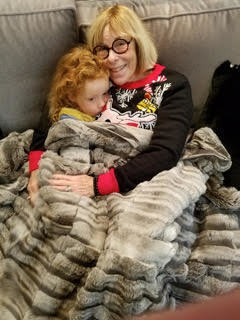Louise Stanger is a speaker, educator, licensed clinician, social worker, certified daring way facilitator and interventionist who uses an invitational intervention approach to work with complicated mental health, substance abuse, chronic pain and process addiction clients.
Have you ever had a lousy day? The kind where cat videos and goofy memes can’t even turn that frown upside down? Maybe try a hug – a big bear hug with a good friend. Hugs have the power to release “feel good” hormones, relieve stress and even help protect from catching the common cold.

If hugs are so wonderful, why aren’t more given? In honor of National Hugging Day on January 21st, founded in 1986, I propose every person give at least one hug. The benefits of a hug speaks for itself. In fact, according to a study at Carnegie Mellon published at US News & World Report, hugging can help you avoid getting sick because people who perceive greater social support (i.e. from a warm embrace) are less likely to catch a cold or other benign sickness. Move aside apples, hugs are the new thing to keep the doctor away.

Why are hugs so helpful? “Hugging is a marker of intimacy and helps generate the feeling that others are there to help in the face of adversity,” says one researcher from the Carnegie Mellon study. In addition to that, MBG Mindfulness, a blog for health and wellness, writes about 10 Reasons Why We Need at Least 8 Hugs a Day. Here are some of those reasons:
- Holding a hug, hearts pressed together, increases serotonin levels, thereby elevating mood.
- Likewise, hugging releases oxytocin, a “bonding” hormone which creates attachment in relationships.
- Hugging relaxes muscles. When embracing in a hug, blood circulation increases, easing tension in muscles.
- Hugging pulls us into the moment and makes us dwell on the present. In addition to being a pivotal part of meditation, living in the present moment teaches us to build happiness and meaning and hold on to it.
- Hugging, an action that requires two willing participants, teaches us the give and take in building relationships.
- Hugging boosts self esteem and makes you feel better about yourself.
- Hugs have been recently used as fundraisers. How many hugs can you give away to raise money for your favorite fundraiser?
So hugs help our health – mind, body and soul – in biological and spiritual ways. How many do we need each day to sustain these lasting benefits? According to Virginia Satir, the founder of Transformational Systemic Therapy, “we need four hugs a day for survival. We need eight hugs a day for maintenance. We need twelve hugs a day for growth.” Clearly, hugging needs to be higher up on our to-do lists.

As a professional addiction interventionist, family specialist clinician and social worker, I work with families and their loved ones experiencing substance abuse, mental health or process disorders return to a place of health and well-being, not unlike the positive benefits of a hug. Hope and healing is available.
Who have you hugged today?
To learn more about Louise Stanger and her interventions and other resources, visit her website.
Originally published at www.huffingtonpost.com


